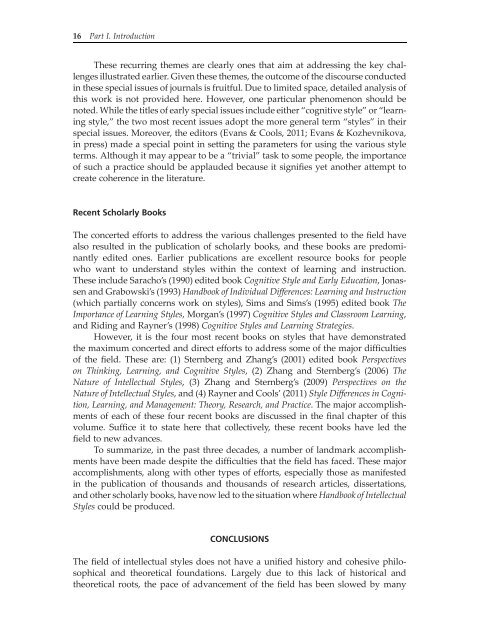Handbook of Intellectual Styles - Springer Publishing
Handbook of Intellectual Styles - Springer Publishing
Handbook of Intellectual Styles - Springer Publishing
Create successful ePaper yourself
Turn your PDF publications into a flip-book with our unique Google optimized e-Paper software.
16 Part I. Introduction<br />
These recurring themes are clearly ones that aim at addressing the key challenges<br />
illustrated earlier. Given these themes, the outcome <strong>of</strong> the discourse conducted<br />
in these special issues <strong>of</strong> journals is fruitful. Due to limited space, detailed analysis <strong>of</strong><br />
this work is not provided here. However, one particular phenomenon should be<br />
noted. While the titles <strong>of</strong> early special issues include either “cognitive style” or “learning<br />
style,” the two most recent issues adopt the more general term “styles” in their<br />
special issues. Moreover, the editors (Evans & Cools, 2011; Evans & Kozhevnikova,<br />
in press) made a special point in setting the parameters for using the various style<br />
terms. Although it may appear to be a “trivial” task to some people, the importance<br />
<strong>of</strong> such a practice should be applauded because it signifies yet another attempt to<br />
create coherence in the literature.<br />
Recent Scholarly Books<br />
The concerted efforts to address the various challenges presented to the field have<br />
also resulted in the publication <strong>of</strong> scholarly books, and these books are predominantly<br />
edited ones. Earlier publications are excellent resource books for people<br />
who want to understand styles within the context <strong>of</strong> learning and instruction.<br />
These include Saracho’s (1990) edited book Cognitive Style and Early Education, Jonassen<br />
and Grabowski’s (1993) <strong>Handbook</strong> <strong>of</strong> Individual Differences: Learning and Instruction<br />
(which partially concerns work on styles), Sims and Sims’s (1995) edited book The<br />
Importance <strong>of</strong> Learning <strong>Styles</strong>, Morgan’s (1997) Cognitive <strong>Styles</strong> and Classroom Learning,<br />
and Riding and Rayner’s (1998) Cognitive <strong>Styles</strong> and Learning Strategies.<br />
However, it is the four most recent books on styles that have demonstrated<br />
the maximum concerted and direct efforts to address some <strong>of</strong> the major difficulties<br />
<strong>of</strong> the field. These are: (1) Sternberg and Zhang’s (2001) edited book Perspectives<br />
on Thinking, Learning, and Cognitive <strong>Styles</strong>, (2) Zhang and Sternberg’s (2006) The<br />
Nature <strong>of</strong> <strong>Intellectual</strong> <strong>Styles</strong>, (3) Zhang and Sternberg’s (2009) Perspectives on the<br />
Nature <strong>of</strong> <strong>Intellectual</strong> <strong>Styles</strong>, and (4) Rayner and Cools’ (2011) Style Differences in Cognition,<br />
Learning, and Management: Theory, Research, and Practice. The major accomplishments<br />
<strong>of</strong> each <strong>of</strong> these four recent books are discussed in the final chapter <strong>of</strong> this<br />
volume. Suffice it to state here that collectively, these recent books have led the<br />
field to new advances.<br />
To summarize, in the past three decades, a number <strong>of</strong> landmark accomplishments<br />
have been made despite the difficulties that the field has faced. These major<br />
accomplishments, along with other types <strong>of</strong> efforts, especially those as manifested<br />
in the publication <strong>of</strong> thousands and thousands <strong>of</strong> research articles, dissertations,<br />
and other scholarly books, have now led to the situation where <strong>Handbook</strong> <strong>of</strong> <strong>Intellectual</strong><br />
<strong>Styles</strong> could be produced.<br />
CONCLUSIONS<br />
The field <strong>of</strong> intellectual styles does not have a unified history and cohesive philosophical<br />
and theoretical foundations. Largely due to this lack <strong>of</strong> historical and<br />
theoretical roots, the pace <strong>of</strong> advancement <strong>of</strong> the field has been slowed by many

















